Kenneth Atchity's Blog, page 82
March 10, 2020
Roy Freirich, in conversation with Jeff Dorchen, discusses and signs Deprivation
Please join them for excerpts, stories, wine and cheese, and insomnia. Thur. Mar. 12th, 7:00 pm PDT
Book Soup 8818 Sunset Blvd West Hollywood, CA 90069


Book Soup 8818 Sunset Blvd West Hollywood, CA 90069


Published on March 10, 2020 15:12
Women's History Month: When Hollywood’s Power Players Were Women
Female writers, directors, and producers were pioneers of the silent-film era—but were pushed out of the industry as its influence grew.
 Lois Weber, a prolific screenwriter and director, was the first woman to establish her own film studio.HULTON ARCHIVE / GETTY
Lois Weber, a prolific screenwriter and director, was the first woman to establish her own film studio.HULTON ARCHIVE / GETTY
Given the dearth of women among this year’s Oscar nominees for writing and directing, not to mention behind the camera in Hollywood at all, you may be surprised to learn that before 1925, during the silent film era, women wrote the outlines for roughly half of all films. In fact, a great many women were behind the camera in those days—producing and directing films, and running studios. Women also pioneered much of the film technology that still exists today—only to be pushed out of the burgeoning industry once its influence and moneymaking potential had become more widely recognized.
When the writer and satirist Dorothy Parker and her writer husband, Alan Campbell, moved to Hollywood and signed contracts with Paramount, she was paid four times as much as he was. Frances Marion, who would go on to become the founding vice president of the Screen Writers Guild, was the country’s highest-paid screenwriter in the 1920s and ’30s; more than 100 of her scripts were made into films, and in 1930, she became the first woman to win an Oscar for writing. Lois Weber, a prolific screenwriter and director, in 1917 became the first woman to establish and run her own film studio. The year before, her wage as a director was the highest in Hollywood.
Read more

 Lois Weber, a prolific screenwriter and director, was the first woman to establish her own film studio.HULTON ARCHIVE / GETTY
Lois Weber, a prolific screenwriter and director, was the first woman to establish her own film studio.HULTON ARCHIVE / GETTYGiven the dearth of women among this year’s Oscar nominees for writing and directing, not to mention behind the camera in Hollywood at all, you may be surprised to learn that before 1925, during the silent film era, women wrote the outlines for roughly half of all films. In fact, a great many women were behind the camera in those days—producing and directing films, and running studios. Women also pioneered much of the film technology that still exists today—only to be pushed out of the burgeoning industry once its influence and moneymaking potential had become more widely recognized.
When the writer and satirist Dorothy Parker and her writer husband, Alan Campbell, moved to Hollywood and signed contracts with Paramount, she was paid four times as much as he was. Frances Marion, who would go on to become the founding vice president of the Screen Writers Guild, was the country’s highest-paid screenwriter in the 1920s and ’30s; more than 100 of her scripts were made into films, and in 1930, she became the first woman to win an Oscar for writing. Lois Weber, a prolific screenwriter and director, in 1917 became the first woman to establish and run her own film studio. The year before, her wage as a director was the highest in Hollywood.
Read more

Published on March 10, 2020 00:00
March 9, 2020
Women's History Month: Virginia Woolf - Time Woman of the Year 1929

Illustration by Oliver Sin for TIME; George C. Beresford—Hulton Archive/Getty
MARCH 5, 2020
In 1928, addressing distinguished female students at the University of Cambridge, novelist and critic Virginia Woolf declared, “A woman must have money and a room of one’s own if she is to write fiction.” Replace “write fiction” with any creative, intellectual or political pursuit, and in a sentence, Woolf had summed up millennia of inequality. In her 1929 extended essay “A Room of One’s Own,” Woolf played with both fiction and nonfiction, building on the themes of her lectures. She invented the indelible figure of Judith Shakespeare, sister of William, who had equal talent but would never become a world-famous playwright because she was barred from education and relegated to the home.
Suddenly, readers imagined a world history filled with the ghosts of gifted women and the works they never had the opportunity to create. Before 1929, Woolf had established herself with Mrs. Dalloway and To the Lighthouse as one of the boldest novelists of the 20th century, and then when “A Room of One’s Own” was published to both celebration and outrage, she became a political visionary too. Her essays were—and still are—a rallying call to women around the world. —Lucas Wittmann
Read more

Published on March 09, 2020 00:00
March 6, 2020
Coming Soon From Story Merchant Books!
Published on March 06, 2020 00:00
March 4, 2020
The Last Full Measure - Audience Reactions
THE LAST FULL MEASURE tells the true story of Vietnam War hero William H. Pitsenbarger (Jeremy Irvine), a U.S. Air Force Pararescuemen (also known as a PJ) medic who personally saved over sixty men.
During a rescue mission on April 11, 1966, he was offered the chance to escape on the last helicopter out of a combat zone heavily under fire, but he stayed behind to save and defend the lives of his fellow soldiers of the U.S. Army's 1st Infantry Division, before making the ultimate sacrifice in the bloodiest battle of the war.
Thirty-two years later, respected Pentagon staffer Scott Huffman (Sebastien Stan) on a career fast-track is tasked with investigating a Congressional Medal of Honor request for Pitsenbarger made by his best friend and PJ mission partner (William Hurt) and his parents (Christopher Plummer & Diane Ladd). Huffman seeks out the testimony of Army veterans who witnessed Pitsenbarger’s extraordinary valor, including Takoda (Samuel L. Jackson), Burr (Peter Fonda) and Mott (Ed Harris). But as Huffman learns more about Pitsenbarger’s courageous acts, he uncovers a high-level conspiracy behind the decades-long denial of the medal, prompting him to put his own career on the line to seek justice for the fallen airman.
With a superb all-star cast and an emotionally gripping story, The Last Full Measure is a film everyone should see. Get tickets: www.thelastfullmeasurefilm.com

Published on March 04, 2020 00:00
March 2, 2020
Celebrating Disappointment by Kenneth John Atchity
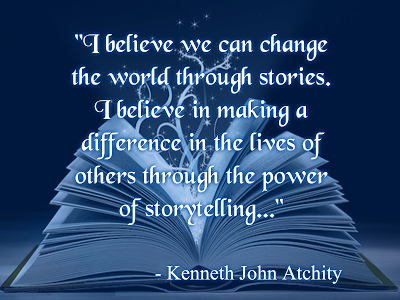
Are you disappointed? We all get disappointed by life from time to time and, in these “interesting” times, no doubt more often than usual.
Maybe because I savored my Roman Catholic upbringing, I was drawn to a profession in which rejection became not a daily occurrence, but an hourly one—until the email era, in which rejections come in once every few minutes! As an intellectual property manager, I try to tell my rejected clients that every no is a step further to the one yes we’re looking for. I remind them of a story I was once told:
There’s a big blackboard in the sky. On it are all the NOS you or your dream project will ever get. And there too is the final YES.
The only problem is that you can’t see the blackboard.
Since this is the case, what does the dreamer do? Only three things:
Never give up. You never know, but the YES may be lurking behind the NO that makes you want to throw in the towel. There’s only one way to find out: Persist. As long as you live and breathe. My definition of a happy death is dying in the middle of your dream.
Get through the NOS as fast as you can.
Don’t think negatively about them. Do you really wish your dream was accepted by the WRONG person? That’s what a NO is, a wrong person for your dream. Nothing would be worse, believe me, than having your dream partnered with someone you talked into it when they didn’t see it in the first place.
Celebrate each NO as a step forward toward making your dream come true. No successful dreamer has succeeded without dealing with rejection over and over. Edison….
Disappointment and celebration. To live a happy life, you can’t have one without the other. Think of them as life’s teeter-totter, disappointment on one seat, celebration on the other.
Imagine that you’re on that teeter-totter (because you are) but don’t understand how it works. Every time disappointment has the upper position, you sit there like a lump on a log and bemoan your fate.
That will literally get you nowhere, allowing disappointment to maintain the upper hand. I went to an ashram outside of Delhi some years ago, to check out for myself whether a certain guru was all my current girlfriend believed he was cracked up to be.
I have to admit I was nodding during most of the program, but during the question and answer period I came awake as I heard a distraught westerner lament that she tried so hard to lead the path of perfection and serenity but, because she was only mortal, kept falling. “What shall I do?”
He looked at her with that infinite ennui that teachers who have heard it all a thousand times experience, and said:
“Pick yourself up and keep going.”
“Master, I try to do that,” she lamented. “But I am weak, and I only fall again. How many times can I pick myself up?”
“Sister,” the wise man replied, “how many times can you fall?”
That’s when I decided he was indeed a wise man.
You’re sitting there on the ground, disappointment in the air, wondering your glass of life is half-empty. Finally you get tired of the half-empty glass. Or you figure it out—or you remember--and you use your legs as pistons and celebrate your ability to return to the top of the teeter-totter where your glass of life appears to be more than half full!
That’s celebration in action, countering disappointment. That’s optimism, the only logical program to adopt for life. It’s logical because it either proves to be justified—by success; or you’ll actually never know because you remain optimistic to the end. That’s why, in The Godfather, we all loved the Don Corleone’s last words as he fell to his knees with a massive stroke in the tomato garden: “La vita é cosí bella…Life is so beautiful”—optimistic to the un-bitter end.
Don’t think I’m not as bad as the woman at the ashram in terms of sitting at the bottom of the teeter-totter wondering what happened to put disappointment in the cat bird seat. I am as good at lamenting as the next guy, maybe even better! One day I was complaining to my best friend (you need to be careful who you complain to, by the way) about a clump of setbacks that happened one after another, yet another reflection of the turmoil of our times. I recited them to my friend and explained why I questioned whether life was still worth living.
He said, “So some deals fell through, and so it’s hard to earn a living.
“But you don’t have mongoloid children, but two kids who are earning a living and leading an okay life. You go back and forth to New York whenever you want to. You have a beautiful Japanese wife who cooks, takes care of the house, works hard, has her own non-profit, loves you. Loves you. Your brother is not in jail, but is a millionaire who leaves you alone. Your sisters aren’t drug addicts, but doing okay. You aren’t pushing a walker, you ARE playing tennis 3 times a week. You’ve been involved in a whole bunch of books that have your name in them. You’ve been involved in a bunch of movies. You have a bunch of projects that are still viable. You have friends who haven’t killed you yet. You’re not driving a junk heap but a luxury sedan with air conditioning. You have a view out three sides of your apartment in L.A. You have a cat who loves you. You meet Hollywood people and literary people all the time. You’ve developed your companies in a whole new direction and had the best year in six years last year. You have several major feature films nearing production. WHAT IS WRONG WITH YOUR ATTITUDE?”
One thing about attitude: you’re entirely in charge of it. Celebrate that. Celebrate that the problems you have are the ones you asked for. The cost of admission to the stage of your life.
Reposted from Tome Tender

Published on March 02, 2020 00:00
February 29, 2020
How To Read More Books
Maybe you'll relate to this scene: you're sitting around, cracking open a good book and thinking of all the incredible knowledge you will drink up. Then suddenly, it's two hours later and you're three months back in an Instagram account about cats with their mouths open (side note: it exists, and I love it) and the book is just sitting there, judging you quietly from where you put it down.
If this is you, you're (clearly) not alone! Making time to read is increasingly hard, what with your phone and the latest binge-worthy TV show just waiting to suck up all of your attention. But never fear, future book nerd — Life Kit has your back. We talked to the experts and got some really good best practices that will hopefully transform you into a regular Hermione Granger.
Lynn Neary has been covering books for NPR for over a decade and even though she could probably pave a road to the moon with the books she's read for her job, she says she's not a speed reader by any means, and doesn't judge herself for that. Here's her advice:
1. Read in the morning
"What I've found is a really good time for me is to read in the morning — particularly on weekend mornings," Neary says. "I love to lie in bed on weekend mornings and read. It's just one of my favorite things to do now, and I get a lot of reading done at that time." Doesn't that sound just lovely? Sure, it might not be right for everyone (I see you, chronic snoozers!) but waking up first thing in the morning and getting a few pages in is a good way to start your day. Plus, Neary says, it means you won't fall asleep the way you can if you try and read before bed.
Our second piece of advice comes from a man who reads 100 books a year. ONE HUNDRED! I can barely do one hundred sit ups in a year, so truly I feel like he's achieving greatness. Kevin Nguyen has been writing about books for the majority of his career and even has a piece in GQ that can give you even more advice. His advice for folks who want to read more is our second takeaway:
2. Read wherever, whenever (especially when commuting!)
As the great prophet Shakira quoth: wherever, whenever. When Nguyen walked into the studio to record our Life Kit episode, he had two paper books in his bag and three more that he was reading on his phone! He says that having books with you at all times is a great way to get in a few pages here and there. Commute times in the U.S. are also at a record high, which means that if you wanna be a bigger bookworm like Nguyen means you can spend those precious minutes reading. "The hardest part about reading a book in 2019 is just opening the book," Nguyen says. "We have in our imagination, like oh reading time is like this luxurious thing and I'm in my armchair sipping scotch. You have to make it a more regular habit than that because if you just wait for all those moments you're never gonna finish a book."
3. Tailor the book to the situation
This is another genius Kevin Nguyen tip! "We should think about it like you sit down and watch Netflix," Nguyen says. "Maybe one day you'll get to that queue of documentaries but you're probably just going to watch The Office." Nguyen says that you should apply the same thing to the books you're reading. So, just like you would choose a really peppy song for a workout, you could choose a breezy book for when you're waiting to pick up your coffee. And, conversely, when you have a little bit more time to focus, you can read something that's a little more involved. Cool, right?
Read more

If this is you, you're (clearly) not alone! Making time to read is increasingly hard, what with your phone and the latest binge-worthy TV show just waiting to suck up all of your attention. But never fear, future book nerd — Life Kit has your back. We talked to the experts and got some really good best practices that will hopefully transform you into a regular Hermione Granger.
Lynn Neary has been covering books for NPR for over a decade and even though she could probably pave a road to the moon with the books she's read for her job, she says she's not a speed reader by any means, and doesn't judge herself for that. Here's her advice:
1. Read in the morning
"What I've found is a really good time for me is to read in the morning — particularly on weekend mornings," Neary says. "I love to lie in bed on weekend mornings and read. It's just one of my favorite things to do now, and I get a lot of reading done at that time." Doesn't that sound just lovely? Sure, it might not be right for everyone (I see you, chronic snoozers!) but waking up first thing in the morning and getting a few pages in is a good way to start your day. Plus, Neary says, it means you won't fall asleep the way you can if you try and read before bed.
Our second piece of advice comes from a man who reads 100 books a year. ONE HUNDRED! I can barely do one hundred sit ups in a year, so truly I feel like he's achieving greatness. Kevin Nguyen has been writing about books for the majority of his career and even has a piece in GQ that can give you even more advice. His advice for folks who want to read more is our second takeaway:
2. Read wherever, whenever (especially when commuting!)
As the great prophet Shakira quoth: wherever, whenever. When Nguyen walked into the studio to record our Life Kit episode, he had two paper books in his bag and three more that he was reading on his phone! He says that having books with you at all times is a great way to get in a few pages here and there. Commute times in the U.S. are also at a record high, which means that if you wanna be a bigger bookworm like Nguyen means you can spend those precious minutes reading. "The hardest part about reading a book in 2019 is just opening the book," Nguyen says. "We have in our imagination, like oh reading time is like this luxurious thing and I'm in my armchair sipping scotch. You have to make it a more regular habit than that because if you just wait for all those moments you're never gonna finish a book."
3. Tailor the book to the situation
This is another genius Kevin Nguyen tip! "We should think about it like you sit down and watch Netflix," Nguyen says. "Maybe one day you'll get to that queue of documentaries but you're probably just going to watch The Office." Nguyen says that you should apply the same thing to the books you're reading. So, just like you would choose a really peppy song for a workout, you could choose a breezy book for when you're waiting to pick up your coffee. And, conversely, when you have a little bit more time to focus, you can read something that's a little more involved. Cool, right?
Read more

Published on February 29, 2020 00:00
February 27, 2020
"Writing must have an element of magic to it. When that m...
"Writing must have an element of magic to it. When that magic takes over, the writer himself loses track of time during the writing—and the reader will lose track of time during the reading. If you’re happy at work and think of it as your own private briar patch—a place of escape from the world in which time is your time—the clock of life becomes your clock, and even the thorns in that briar patch are of your own choosing.”
― Kenneth Atchity, Write Time: Guide to the Creative Process, from Vision through Revision-and Beyond
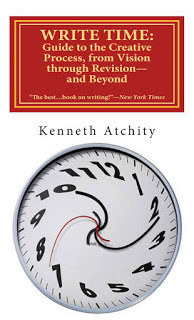 Available on Amazon
Available on Amazon
― Kenneth Atchity, Write Time: Guide to the Creative Process, from Vision through Revision-and Beyond
 Available on Amazon
Available on Amazon
Published on February 27, 2020 00:00
February 26, 2020
Library Life...
Not a NYT best seller yet but the local library has this on their New Arrivals shelf!
A Potter's Tale by Dave Davis... murder, betrayal and a collapsing universe. Oh, and a little romance!


A Potter's Tale by Dave Davis... murder, betrayal and a collapsing universe. Oh, and a little romance!


Published on February 26, 2020 09:35
February 24, 2020
Welcome Back to Gotham City Interview with Dennis Palumbo
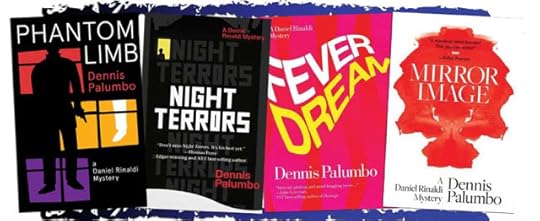
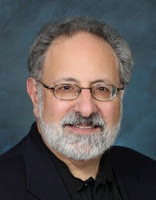 Dennis, you’re a Pittsburgh native but now have a psychotherapy practice in Los Angeles. I can understand why you’d want to place the Daniel Rinaldi thrillers in the Steel City. Are there any plans for sending Rinaldi to LA in the future?
Dennis, you’re a Pittsburgh native but now have a psychotherapy practice in Los Angeles. I can understand why you’d want to place the Daniel Rinaldi thrillers in the Steel City. Are there any plans for sending Rinaldi to LA in the future?Not at the moment, but you never know. The Eastern guy experiencing LA for the first time has been done to death, so I’d have to come up with a pretty compelling reason to send Daniel Rinaldi to the City of Angels.
Like you, Rinaldi’s a psychologist from Pittsburgh. But rather than merely grafting some of your experience onto your protagonist, you’re using your three decades of being a licensed psychotherapist to make you a better writer. Almost exactly two years ago, you’d written an article for The Strand Magazine saying how, precisely, being a psychologist has made you a better writer. It’s one thing to analyze a living human mind and another entirely to analyze one that you first have to create within yet outside your own. Which is more difficult for you?
Well, I find doing therapy and writing to be similar in that both are difficult but satisfying. In the clinical setting, one of the most crucial traits for a therapist is the ability not only to empathize with a patient but to relate to that patient. In other words, the therapist has to take ownership him- or herself of many of the same feeling states and core meanings that the patient exhibits. I believe the same is true when crafting characters. In my view, all writing (whether fictional or nonfictional, and regardless of genre or medium) is autobiographical. The characters in my Rinaldi mysteries are all birthed from within my own psyche, and represent my own experiences, prejudices, virtues and vices. Even the bad guys! I sincerely believe that the more a writer mines his or her own feelings and beliefs, the more personally relevant the writing becomes, which translates to the narrative being more compelling to the reader. As Emerson said, “To believe that what is true in your own heart is true for everyone---that is genius.”
Every hero has a weakness. What’s Rinaldi’s demon, his nemesis?
He has several. In general, he certainly drinks too much and can be a real smartass when dealing with authority figures, both among his clinical colleagues and with the Pittsburgh Police officials with whom he works. He’s very stubborn, can be quick to anger, and sometimes resorts to fairly unconventional means as a therapist in pursuit of helping his patients. Many of his professional colleagues view him as a maverick, which doesn’t bother him one bit.
At a deeper level, he still struggles with survival guilt, having survived a murderous assault that killed his wife but left him alive. Having been an amateur boxer in his youth, Rinaldi feels he should have been able to stop the assailant. But, more to the point, having survived at all has fed his survival guilt to such an extent that friends and colleagues fear he has a “hero complex” or “death wish.” So besides his clinical specialty of treating victims of violent crime---who often struggle with the classic symptoms of PTSD---he tends to see his work as a kind of “mission” that results in his getting involved in high-profile criminal cases, despite the protest of the Pittsburgh PD.
Have any of your patients ever made their way into one of your novels?
Not directly, no. However, the issues that patients with whom I’ve worked have had to address---both in my private practice and my internship at a private psychiatric clinic---
show up in all of my novels. From depression and anxiety to substance use and relationship crises, emotional and psychological issues underlie the themes of all of my stories. Because I write mystery thrillers, these issues are enhanced or exaggerated for dramatic effect, and to sharpen the edges of my characters, but I try not to stray too far from reality. In other words, when I portray a narcissist or sociopath, I make the portrait as accurate as I can, just as I try to describe the trauma symptoms (PTSD, etc.) that arise from horrific personal events as realistically as possible.
Your career arc is almost a complete circle. You started out as a TV and screenwriter, then you became a psychotherapist before deciding to take up novel writing. Was this a deliberate circular route or did you just fall back into the writing game?
None of my career path was planned, though it does have the circularity you mentioned. In college, my goal was to be a novelist. However, when I also discovered a love for film and TV, I moved to Los Angeles to pursue those goals. I was very lucky in my Hollywood career, and when I retired to go back to grad school and become a licensed therapist, I thought my writing days were behind me. But the bug never went away, and after building up my private practice, I started writing short stories and essays, until finally getting the opportunity to do what I’d originally intended, which was to write novels. Since I’d loved mysteries since my Dad bought me “The Adventures of Sherlock Holmes” when I was home sick from school, I figured why not create a series character? And that’s how Daniel Rinaldi came to be. Perhaps most gratifying is that doing the series allows me to write about two things that I love: my hometown of Pittsburgh and the profession of psychology. They both provide (to me, at least!) a fascinating world from which to fashion suspenseful, complex thrillers.
Put yourself on the couch for a moment. You’d written an essay explaining how being a psychologist has made you a better novelist. But is the reverse true? Has being a novelist made you a better psychotherapist dealing with other creative types?
It’s hard to say, since most of my patients are in the entertainment industry, and so I tend to think that it’s my own seventeen-year experience in Hollywood that offers me a unique perspective when dealing with these patients. But I’m sure that in ways too difficult to quantify, my dozen years as a series novelist has given me an even deeper appreciation of the struggles all creative types go through. Including me.
In an earlier interview, you mentioned a pivotal “Road to Damascus” epiphany after a talk with a Hollywood producer and it led you to abandon your TV and film work and devote yourself exclusively to your patients. So was there a similar turning point that led you to get back into writing or did you know you were temporarily lying fallow?
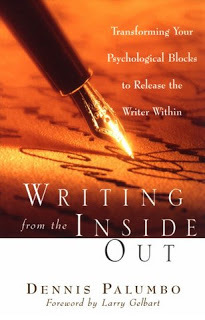 As I mentioned above, I did think that after attaining my clinical license and going into private practice my writing life was behind me. But after being asked to contribute an article about writing to WRITTEN BY (the magazine of the Writers Guild of America), I realized my love for putting one word after the other had never gone away. That article led to a monthly column in the magazine (called “The Writer’s Life”) which addressed the issues most writers struggle with: blocks, procrastination, rejection, fears of failure, etc. Then the column led to a book called WRITING FROM THE INSIDE OUT. By now, I’d returned to submitting mystery short stories to various magazines, something I’d done even throughout my show business career. So I think it was a natural leap to the idea of writing books, particularly a mystery series.
As I mentioned above, I did think that after attaining my clinical license and going into private practice my writing life was behind me. But after being asked to contribute an article about writing to WRITTEN BY (the magazine of the Writers Guild of America), I realized my love for putting one word after the other had never gone away. That article led to a monthly column in the magazine (called “The Writer’s Life”) which addressed the issues most writers struggle with: blocks, procrastination, rejection, fears of failure, etc. Then the column led to a book called WRITING FROM THE INSIDE OUT. By now, I’d returned to submitting mystery short stories to various magazines, something I’d done even throughout my show business career. So I think it was a natural leap to the idea of writing books, particularly a mystery series. You co-wrote My Favorite Year (a nominee for a Writers’ Guild of America award). As a young screenwriter, how did it feel hearing Joseph Bologna and Peter O’Toole speaking your dialogue for the first time?
Pretty amazing, though it’s important to remember a film is a group effort. Not only was the script co-written by Norman Steinberg, but there was the usual amount of ad-libbing and other creative bursts while the film was being shot.
Was O’Toole’s character Alan Swann based on a specific actor you knew in Hollywood, was he an amalgam of several or was he pure fiction?
That’s an easy one. The character is wholly based on Errol Flynn, my Dad’s favorite movie star. I remember watching the Late Show on TV with him, where he’d introduced me to The Adventures of Robin Hood and Captain Blood. I wrote the first draft of the script specifically for Peter O’Toole, an actor I’d always loved. There were, of course, many fictional aspects woven into the script. For example, while the film explores what happens when an Errol Flynn-like character is booked to appear on a TV show modeled on Your Show of Shows, in reality Flynn was never a guest on the actual real-life program.
I know you’re juggling a psychotherapy career with running your personal life and several other commitments but what’s your typical writing day like? Do you set word goals, use a notebook, laptop or a combination of both?
I’m afraid I’m not that organized! Given the weight of a full therapy practice, I write whenever I can squeeze in an hour or two, which is why so many years go by between Daniel Rinaldi novels. I know my crime-writing colleagues often turn out a book a year (and sometimes two!), a situation I can only dream about. On the other hand, I like the balance that I have to maintain between my two careers. Especially, as I’ve alluded to above, I believe one feeds the other. In terms of writing tools, I write directly on my laptop.
Is Daniel Rinaldi the only series on the horizon or are you mulling/planning another?
Believe me, I’m amazed that I’ve turned out five books in the Rinaldi series so far. The thought of considering another series gives me a headache. But if I’ve learned anything over the years, it’s that my crystal ball has a lot of cracks in it, so my predictions about the future aren’t to be trusted.
I already know the answer to this since I’ve read your old interviews but for the readers at home, are you a plotter, pantser or plantser?
Definitely a pantser. I literally have no idea what each Rinaldi book is going to be about when I start. I tend to pick a murder victim about fifty-sixty pages in, and then figure out the culprit by about page 200. Then, of course, I have to go back and seed in all the clues, red herrings, etc. It’s funny, because often readers tell me they love the twists and turns in my narratives, the unexpected surprises, etc. What they don’t know is that these twists and turns come as a surprise to me, too! They just announce themselves to me as I’m writing. Obviously, this approach isn’t for everyone, since it’s clumsy and requires a lot of re-writing. But I don’t mind, since I’d rather write than think.
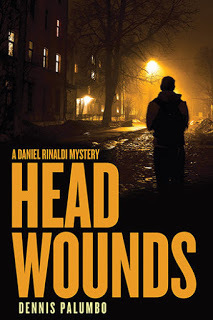 Since the first entry in the Rinaldi series, Mirror Image, debuted a decade ago, you’ve gotten plaudits from luminaries in the mystery-writing community such as John Lescroart, Thomas Perry, Stephen J. Cannell, T. Jefferson Parker and Ridley Pearson, to name just a few. You’ve been with Poisoned Pen Press the whole time. But if a Big Fiver comes calling, what do you think you’d do?
Since the first entry in the Rinaldi series, Mirror Image, debuted a decade ago, you’ve gotten plaudits from luminaries in the mystery-writing community such as John Lescroart, Thomas Perry, Stephen J. Cannell, T. Jefferson Parker and Ridley Pearson, to name just a few. You’ve been with Poisoned Pen Press the whole time. But if a Big Fiver comes calling, what do you think you’d do?Tough question, since Poisoned Pen Press has become an imprint of SourceBooks, a much bigger publishing entity. In terms of publisher, I don’t know exactly what the future holds, but I remain a huge fan of the people at PPP who’ve remained since the changeover and hope it will continue to be a good fit.
If Daniel Rinaldi had you on the couch, what do you think he’d first ask you?
“Some of the crimes and situations in your stories are so horrific, Mr. Palumbo, I’m worried about you. Are you all right?” If I were to guess, I’d suspect that further therapeutic investigation would suggest that my intense, suspenseful books are a way to explore and expiate my own darkest impulses in a safe, contained way.
What’s next for Doctors Palumbo and Rinaldi?
I’ll have to ask Dr. Rinaldi and get back to you. As you can imagine, he’s a very busy man and not so easy to reach.
Read more

Published on February 24, 2020 00:00





